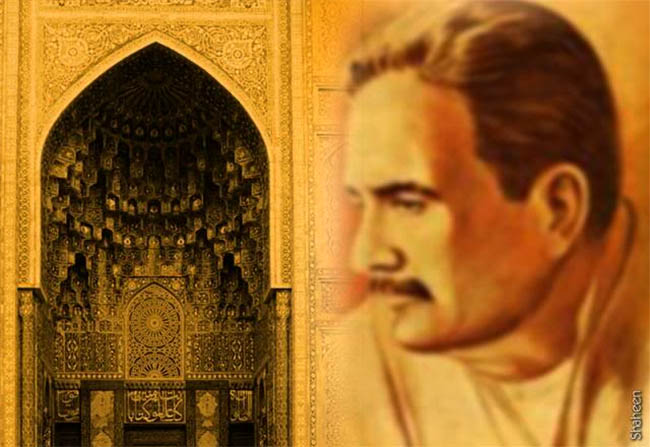Pakistani philosopher and thinker Muhammad Iqbal – also called the ‘Spiritual Father of Pakistan’ – played a highly crucial role in social, cultural, religious, and political arenas. He is known as an eminent poet by regional and global scholars of literature since he articulated his thoughts in soulful poetry.
Iqbal waxed nostalgic about the past glories of Islamic civilization and delivered the message of spiritual focus on Islam as a source for socio-political liberation. He denounced division within and amongst Muslim nations on the grounds of race, sect, or color. He cherished a philosophically lofty ambition for Muslims and dreamt of a civil society void of violence and aggression.
As a religious intellectual, Iqbal felt deeply the excruciating pain of Muslim Ummah and sought to alleviate this unmitigated suffering through releasing Muslim society from the clutch of colonialism. Moreover, the erosion of religious tenets and decline of ethical code and cultural values were the main heartache of Iqbal. He made great efforts to resuscitate religious, cultural, and moral values.
In his poetry, he mourns the decline of Islamic society urging Muslims not to rest on their laurels. His words are replete with strong sentiments as he smoldered with pain about the downfall of Muslim nation. He beckoned Muslims to prophetic practices and Islamic Sunnah and broke the chain of slavery from the feet of his nation through political rehearsals and cultural activities. He freed his people from the political domination and economic exploitation inflicted upon them for years. Factional divisions, sectarian tussles, and radical acts filled him with an outpouring of grief. Therefore, he stressed religious tolerance and moderate practices of Islamic Sharia. He criticized the “intellectual attitudes” of some Islamic scholars as having “reduced the Law of Islamic practically to the state of immobility.” He constantly tolled bell to keep society awake and mobile.
In terms of women, Iqbal called them to protect their hijab and dignity in accordance with Islamic principles. He believed that women have the right to learn knowledge; engage in social, cultural, and political activities; and play their constructive role in society without barriers. According to him, women should be respected in the society and freed from traditional restrictions and superstitious stereotypes which have no rational or religious basis.
Iqbal was a real intellectual who never spread violence or hatred. He neither confirmed radical schools of thought nor secular mentalities – both of which have constituted challenges for Islamic societies. The former have resulted in violence and bloodshed and the latter left a vacuum in the soul of mankind in modern world. Iqbal truly fathomed Islamic principles and devoted himself to articulate those messages to people through his mystical and heartening Persian and Urdu poetry.
Iqbal lived an honorable life and was the epitome of spiritual leader. He was a man of virtue and principle. He did not choose to live like a Sufi – who is indifferent to social and political issues of a society and prays individually from dawn to dusk that will never be a panacea for the challenges of a community. On the contrary, he took active part in social and political activities and, as a devoted intellectual, played his role constructively. Iqbal was a morality-orientated individual and valued moral and spiritual life. He called Muslims to safeguard the pure Islamic culture and not divert from the path and Sunnah of Prophet Muhammad (PBUH). His message to Islamic society was to resist against moral turpitude but must not miss the train of civilization in modern era. To put it succinctly, he did not prevent Muslims from modernization but urged them to live a religious life in the heart of modernity, practice upon moral values, and safeguard their social norms. He was of the opinion that modern charms and attractions should not outshine religious tenets or human practices.
Iqbal’s school of thought will be prolific for all human societies. Iqbal delivered the message of freedom and independence. Although he is the ideological founder of Pakistan and outlined Two-nation theory his political view is productive for all nations and freedom fighters. He dreamt of a utopian world for all mankind and stressed the spirit of brotherhood. It should be noted that his Two-nation theory will not have to be misconstrued as sowing the seeds of discord between nations. He respected the rights, freedoms, dignity, and independence of all nations and wanted to have them respected for Muslims, too. He wished a peaceful coexistence for the entire nation.
To sum up, Iqbal’s statements and poetry carry much weight not only in enhancing literary genre but also in kindling the sensitive individuals and intellectuals. His poetry injects lifeblood into Islamic society. He had his say from the bottom of his heart and his words were tinged with strong sentiment since Iqbal felt the tragedy of his time. That is to say, cultural nakedness, moral corruption, and religious decline filled him with indescribable agony. Therefore, he felt a strong urge to revive the past glories and reform religious Sharia.
To have a healthy society, all members of the human family need to pledge themselves to practice upon the prolific ideas of Muhammad Iqbal, i.e., uphold human rights and dignity, revive moral standards, exercise tolerance, strengthen the spirit of brotherhood, and maintain peace and stability – which were all the dreams of Iqbal for living in a civil community and utopian world.
Home » Opinion » Muhammad Iqbal – A Charismatic Leader
Muhammad Iqbal – A Charismatic Leader
| Hujjatullah Zia

